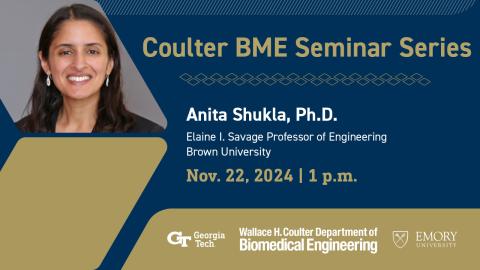
Smart Antimicrobial Drug Delivery Systems
Anita Shukla, Ph.D.
Elaine I. Savage Professor of Engineering, Brown University
Faculty Host: Leslie Chan, PhD
Friday, Nov. 22, 2024
1 -2 p.m.
Pizza at 12:30pm in EBB CHOA before the seminar.
In-Person at Georgia Tech EBB CHOA
Can't attend in person? Join the virtual meeting through Zoom
Meeting ID: 982 0703 2204 | Password: 516014
https://zoom.us/j/98207032204?pwd=OEJYZUtRVzBzdnU5K1ArV2dJUExkQT09
Dial by your location +1 470 250 9358 US (Atlanta)
Abstract:
We have now entered a “post-antibiotic era” in which antimicrobial resistance is leading to fatal outcomes for common, once treatable infections. Bacteria and fungi routinely adapt antimicrobial resistance mechanisms, the rates and complexity of which can be exacerbated by frequent use of broad-spectrum antimicrobials and prolonged exposure. The formation of microbial biofilms further complicates infection treatment.
These complex three-dimensional microbial communities exhibit numerous mechanisms of antibiotic and immune evasion, including a physical barrier to antibiotic diffusion. Smart microbe-responsive and targeted drug delivery systems have the potential to effectively treat and prevent infections, while limiting resistance development and host toxicity. In this talk, I will describe our recent work developing responsive and targeted biomaterials for the treatment of bacterial and fungal infections. These materials range from nanoparticles to functional coatings and hydrogels for the treatment of systemic and localized infections.
I will describe multi-stimuli-responsive biopolymer nanoparticles that have shown promising biofilm penetration and disruption ability. I will also discuss the development of fungi- and bacteria-targeting liposomal nanoparticles. Finally, I will describe our work on bacteria-responsive hydrogels which degrade and release therapeutic cargo specifically in the presence of bacterial beta-lactamases, a family of enzymes commonly involved in antimicrobial resistance. These smart hydrogels exhibit bacteria-triggered drug release properties and enable complete eradication of infection in a murine skin abrasion Pseudomonas aeruginosa infection model, while limiting antibiotic resistance development.
Bio:
Anita Shukla is the Elaine I. Savage Professor of Engineering at Brown University. Her research involves the development of nano- to macroscale biomaterials for the treatment of bacterial and fungal infections. Professor Shukla’s honors include selection as a Fellow of the American Institute for Medical and Biological Engineering (AIMBE) and a National Academy of Medicine (NAM) Emerging Leaders in Health and Medicine Scholar. She is the recipient of a Presidential Early Career Award for Scientists and Engineers (PECASE), a National Science Foundation (NSF) CAREER award, an Office of Naval Research Director of Research Early Career Grant, and a Brown University Early Career Research Achievement Award and Dean’s Award for Excellence in Teaching.
Prior to joining Brown in 2013, Professor Shukla was a National Institutes of Health Ruth Kirschstein postdoctoral fellow in the Department of Bioengineering at Rice University. She received her Ph.D. in Chemical Engineering from the Massachusetts Institute of Technology in 2011 as an NSF Graduate Research Fellow. Professor Shukla also received an M.S. in Chemical Engineering Practice from MIT. She received her B.S. at Carnegie Mellon University in 2006 with majors in chemical engineering and biomedical engineering.